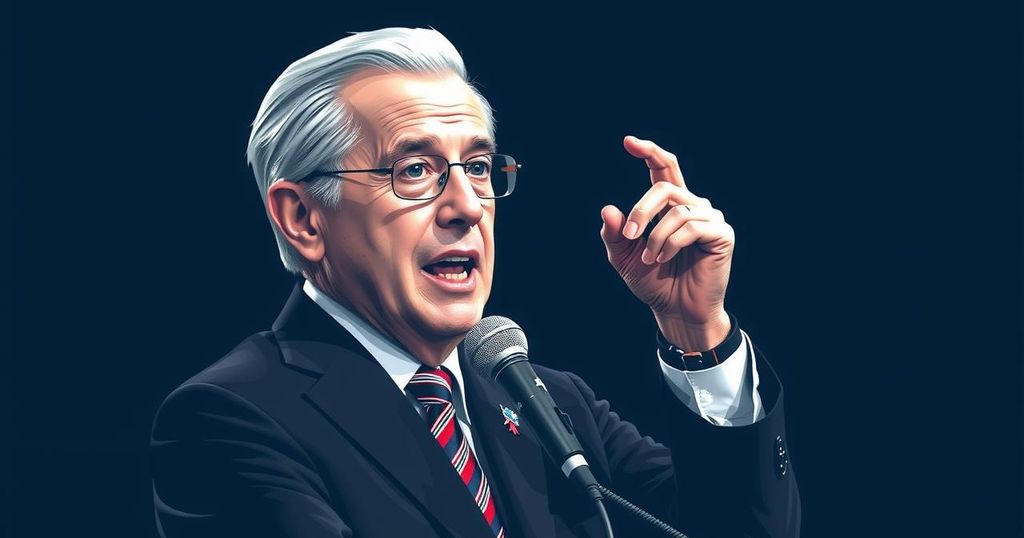Politics
2024 PRESIDENTIAL ELECTION, ASIA, BIDEN, CHICAGO, CONGRESS, DEMOCRATIC PARTY, DEPARTMENT OF NATIONAL INTELLIGENCE, ELECTION, ELECTION 2024, EUROPE, EUROPE/ASIA, FOX, HAWAII, HOUSE APPROPRIATIONS COMMITTEE, ILLINOIS, ISRAEL, KAMAL, NORTH AMERICA, RUSSIA, SYRIA, TRUMP, TU, U.S. PRESIDENCY, UKRAINE, UNITED STATES, US ELECTIONS, VLADIMIR PUTIN
Fatima Khan
0 Comments
Rep. Quigley Attributes Democratic Election Setbacks to Biden’s Unpopularity
Congressman Mike Quigley attributes the Democratic Party’s poor performance in the November elections to President Biden’s low approval ratings, indicating significant challenges for candidates like Kamala Harris. He also expresses concerns over the political landscape in Chicago and criticizes Trump’s cabinet selections, particularly Tulsi Gabbard, while voicing his apprehensions regarding international issues, especially the conflict in Ukraine and the Middle East peace process.
In a recent interview, Congressman Mike Quigley, a prominent member of the House Appropriations Committee from Illinois, attributed the Democratic Party’s disappointing results in the November 5 elections largely to President Joe Biden’s low approval ratings. Quigley remarked, “The bottom line was, it was very difficult for candidate (Kamala) Harris to overcome President Biden’s favorability ratings,” reflecting on Biden’s approval at only 42%. He noted that 65% of voters felt the nation was headed in the wrong direction, a challenging context for any Democratic candidate.
Quigley has been an outspoken critic regarding Biden’s political viability, having called for his withdrawal from the election long before he ultimately did so in July. Although Quigley briefly entertained the idea of entering the race for Chicago mayor in 2023, he opted not to pursue this opportunity. Current Mayor Brandon Johnson is facing significant obstacles in his administration, with a mere 15% approval rating, as a recent Change Research poll indicates. When queried about the possibility of a mayoral run in 2027, Quigley did not dismiss the idea.
Underlining his concerns for Chicago’s future, Quigley stated, “I’m as concerned as anyone with the situation in Chicago, from any number of circumstances, including financial.” He added that the political landscape might shift dramatically, depending on future Congressional actions concerning the Trump administration.
Moreover, Quigley expressed alarm regarding President-elect Donald Trump’s cabinet appointments, particularly criticizing former Representative Tulsi Gabbard’s selection to lead the Department of National Intelligence. He warned of Gabbard’s controversial stances, stating, “I’m not sure she knows what the agency does, and sure as heck doesn’t have the experience to know how to commit those tasks.” Quigley also reflected on Gabbard’s meetings with Syrian President Bashar al-Assad and her favorable remarks about Putin, suggesting that such attitudes could undermine critical international intelligence relations.
As for international affairs, Quigley voiced apprehensions about the prospects for peace in the Middle East, particularly in light of Trump’s rapport with Israeli Prime Minister Benjamin Netanyahu, who is resistant to the two-state solution. He elaborated, “If we’re gonna talk about long-term peace, it means a two-state solution with security for Israel, Gaza and the West Bank.”
Lastly, Quigley, who leads the House Ukraine Caucus, expressed dire concerns over the ongoing conflict in Ukraine amid Russia’s aggression, cautioning about the potential impacts of North Korean troop involvement and Russia’s military advantages, stating, “Putin has four times as many troops and has shown he will treat his soldiers like canon fodder.” These developments pose serious challenges for Ukraine’s future in this war.
The discussion centers on the implications of President Joe Biden’s unpopularity for the Democratic Party, especially in the wake of the November elections. Congressman Quigley’s analysis highlights the significance of public opinion in political contests and the direct impact of leadership approval ratings on electoral outcomes. The broader political climate, including Mayor Johnson’s struggles in Chicago and Trump’s contended cabinet choices, is also encapsulated, setting a stage of urgency in political discourse.
In summary, Congressman Mike Quigley critically examines the impact of President Biden’s unpopularity on the Democratic electoral performance in November. He articulates a need for introspection within the party, especially concerning future elections and international appointments. Quigley’s predictions and assessments reflect broader concerns within the Democratic establishment regarding leadership viability and the geopolitical climate the incoming administration will face.
Original Source: www.fox32chicago.com




Post Comment